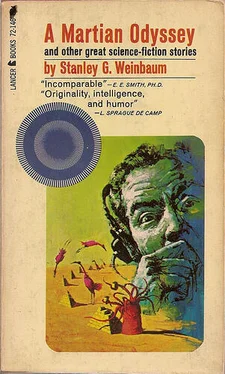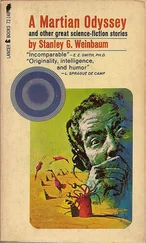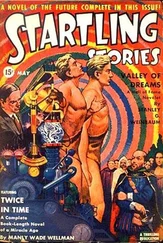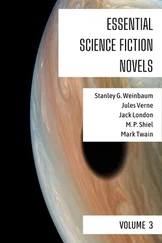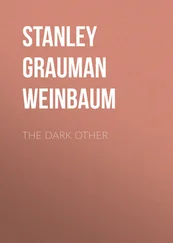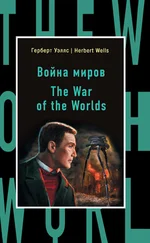Stanley Weinbaum - The Worlds of If
Здесь есть возможность читать онлайн «Stanley Weinbaum - The Worlds of If» весь текст электронной книги совершенно бесплатно (целиком полную версию без сокращений). В некоторых случаях можно слушать аудио, скачать через торрент в формате fb2 и присутствует краткое содержание. Жанр: Фантастика и фэнтези, на английском языке. Описание произведения, (предисловие) а так же отзывы посетителей доступны на портале библиотеки ЛибКат.
- Название:The Worlds of If
- Автор:
- Жанр:
- Год:неизвестен
- ISBN:нет данных
- Рейтинг книги:5 / 5. Голосов: 1
-
Избранное:Добавить в избранное
- Отзывы:
-
Ваша оценка:
- 100
- 1
- 2
- 3
- 4
- 5
The Worlds of If: краткое содержание, описание и аннотация
Предлагаем к чтению аннотацию, описание, краткое содержание или предисловие (зависит от того, что написал сам автор книги «The Worlds of If»). Если вы не нашли необходимую информацию о книге — напишите в комментариях, мы постараемся отыскать её.
The Worlds of If — читать онлайн бесплатно полную книгу (весь текст) целиком
Ниже представлен текст книги, разбитый по страницам. Система сохранения места последней прочитанной страницы, позволяет с удобством читать онлайн бесплатно книгу «The Worlds of If», без необходимости каждый раз заново искать на чём Вы остановились. Поставьте закладку, и сможете в любой момент перейти на страницу, на которой закончили чтение.
Интервал:
Закладка:
I shook my head.
"Idiot!" he snapped. "The conditional worlds, of course! The worlds of 'if.' Ahead are the worlds to be; behind are the worlds that were; to either side are the worlds that might have been — the worlds of 'if!'"
"Eh?" I was puzzled. "Do you mean that you can see what will happen if I do such and such?"
"No!" he snorted. "My machine does not reveal the past nor predict the future. It will show, as I told you, the conditional worlds. You might express it, by 'if I had done such and such, so and so would have happened.' The worlds of the subjunctive mode."
"Now how the devil does it do that?"
"Simple, for van Manderpootz! I use polarized light, polarized not in the horizontal or vertical planes, but in the direction of the fourth dimension — an easy matter. One uses Iceland spar under colossal pressures, that is all. And since the worlds are very thin in the direction of the fourth dimension, the thickness of a single light wave, though it be but millionths of an inch, is sufficient. A considerable improvement over time-traveling in past or future, with its impossible velocities and ridiculous distances!"
"But — are those — worlds of 'if' — real?"
"Real? What is real? They are real, perhaps, in the sense that two is a real number as opposed to [sq]-2, which is imaginary. They are the worlds that would have been if — Do you see?"
I nodded. "Dimly. You could see, for instance, what New York would have been like if England had won the Revolution instead of the Colonies."
"That's the principle, true enough, but you couldn't see that on the machine. Part of it, you see, is a Horsten psychomat (stolen from one of my ideas, by the way) and you, the user, become part of the device. Your own mind is necessary to furnish the background. For instance, if George Washington could have used the mechanism after the signing of peace, he could have seen what you suggest. We can't. You can't even see what would have happened if I hadn't invented the thing, but I can. Do you understand?"
"Of course. You mean the background has to rest in the past experiences of the user."
"You're growing brilliant," he scoffed. "Yes. The device will show ten hours of what would have happened if — condensed, of course, as in a movie, to half an hour's actual time."
"Say, that sounds interesting!"
"You'd like to see it? Is there anything you'd like to find out? Any choice you'd alter?"
"I'll say — a thousand of 'em. I'd like to know what would have happened if I'd sold out my stocks in 2009 instead of '10. I was a millionaire in my own right then, but I was a little — well, a little late in liquidating."
"As usual," remarked van Manderpootz. "Let's go over to the laboratory then."
The professor's quarters were but a block from the campus. He ushered me into the Physics Building, and thence into his own research laboratory, much like the one I had visited during my courses under him. The device — he called it his "subjunctivisor," since it operated in hypothetical worlds — occupied the entire center table. Most of it was merely a Horsten psychomat, but glittering crystalline and glassy was the prism of Iceland spar, the polarizing agent that was the heart of the instrument.
Van Manderpootz pointed to the headpiece. "Put it on," he said, and I sat staring at the screen of the psychomat. I suppose everyone is familiar with the Horsten psychomat; it was as much a fad a few years ago as the ouija board a century back. Yet it isn't just a toy; sometimes, much as the ouija board, it's a real aid to memory. A maze of vague and colored shadows is caused to drift slowly across the screen, and one watches them, meanwhile visualizing whatever scene or circumstances he is trying to remember. He turns a knob that alters the arrangement of lights and shadows, and when, by chance, the design corresponds to his mental picture — presto! There is his scene re-created under his eyes. Of course his own mind adds the details. All the screen actually shows are these tinted blobs of light and shadow, but the thing can be amazingly real. I've seen occasions when I could have sworn the psychomat showed pictures almost as sharp and detailed as reality itself; the illusion is sometimes as startling as that.
Van Manderpootz switched on the light, and the play of shadows began. "Now recall the circumstances of, say, a half-year after the market crash. Turn the knob until the picture clears, then stop. At that point I direct the light of the subjunctivisor upon the screen, and you have nothing to do but watch."
I did as directed. Momentary pictures formed and vanished. The inchoate sounds of the device hummed like distant voices, but without the added suggestion of the picture, they meant nothing. My own face flashed and dissolved and then, finally, I had it. There was a picture of myself sitting in an ill-defined room; that was all. I released the knob and gestured.
A click followed. The light dimmed, then brightened. The picture cleared, and amazingly, another figure emerged, a woman. I recognized her; it was Whimsy White, erstwhile star of television and premiere of the "Vision Varieties of '09." She was changed on that picture, but I recognized her.
I'll say I did! I'd been trailing her all through the boom years of '07 to '10, trying to marry her, while old N. J. raved and ranted and threatened to leave everything to the Society for Rehabilitation of the Gobi Desert. I think those threats were what kept her from accepting me, but after I took my own money and ran it up to a couple of million in that crazy market of '08 and '09, she softened.
Temporarily, that is. When the crash of the spring of '10 came and bounced me back on my father and into the firm of N. J. Wells, her favor dropped a dozen points to the market's one. In February we were engaged, in April we were hardly speaking. In May they sold me out. I'd been late again.
And now, there she was on the psychomat screen, obviously plumping out, and not nearly so pretty as memory had pictured her. She was staring at me with an expression of enmity, and I was glaring back. The buzzes became voices.
"You nit-wit!" she snapped. "You can't bury me out here. I want to go back to New York, where there's a little life. I'm bored with you and your golf."
"And I'm bored with you and your whole dizzy crowd."
"At least they're alive . You're a walking corpse. Just because you were lucky enough to gamble yourself into the money, you think you're a tin god."
"Well, I don't think you're Cleopatra! Those friends of yours — they trail after you because you give parties and spend money — my money."
"Better than spending it to knock a white walnut along a mountainside!"
"Indeed? You ought to try it, Marie." (That was her real name.) "It might help your figure — though I doubt if anything could!"
She glared in rage and — well, that was a painful half hour. I won't give all the details, but I was glad when the screen dissolved into meaningless colored clouds.
"Whew!" I said, staring at Van Manderpootz, who had been reading.
"You liked it?"
"Liked it! Say, I guess I was lucky to be cleaned out. I won't regret it from now on."
"That," said the professor grandly, "is van Manderpootz's great contribution to human happiness. 'Of all sad words of tongue or pen, the saddest are these: It might have been!' True no longer, my friend Dick. Van Manderpootz has shown that the proper reading is, 'It might have been — worse!'"
* * * * *
It was very late when I returned home, and as a result, very late when I rose, and equally late when I got to the office. My father was unnecessarily worked up about it, but he exaggerated when he said I'd never been on time. He forgets the occasions when he's awakened me and dragged me down with him. Nor was it necessary to refer so sarcastically to my missing the Baikal ; I reminded him of the wrecking of the liner, and he responded very heartlessly that if I'd been aboard, the rocket would have been late, and so would have missed colliding with the British fruitship. It was likewise superfluous for him to mention that when he and I had tried to snatch a few weeks of golfing in the mountains, even the spring had been late. I had nothing to do with that.
Читать дальшеИнтервал:
Закладка:
Похожие книги на «The Worlds of If»
Представляем Вашему вниманию похожие книги на «The Worlds of If» списком для выбора. Мы отобрали схожую по названию и смыслу литературу в надежде предоставить читателям больше вариантов отыскать новые, интересные, ещё непрочитанные произведения.
Обсуждение, отзывы о книге «The Worlds of If» и просто собственные мнения читателей. Оставьте ваши комментарии, напишите, что Вы думаете о произведении, его смысле или главных героях. Укажите что конкретно понравилось, а что нет, и почему Вы так считаете.
